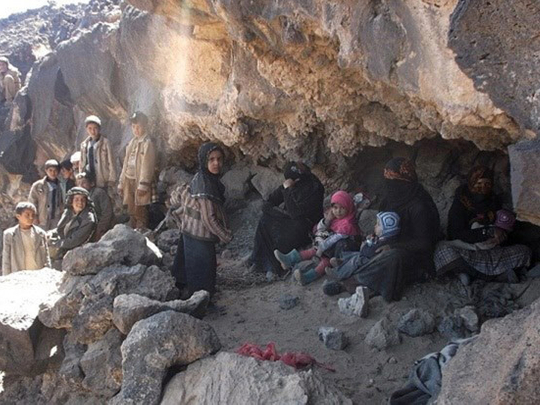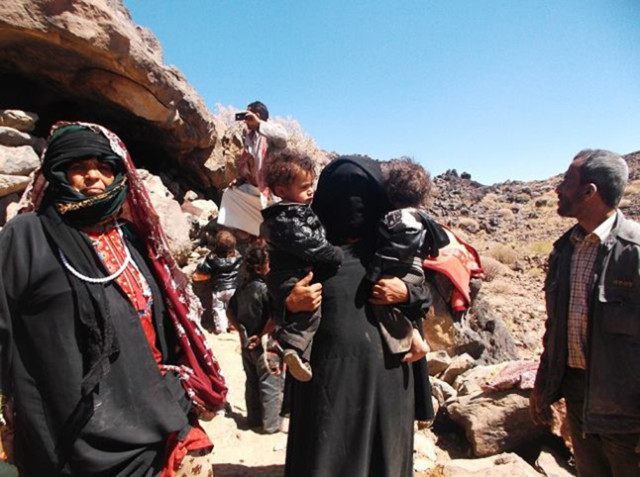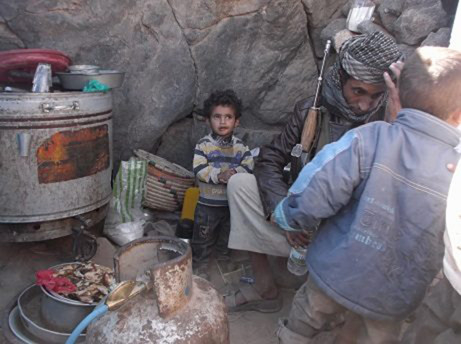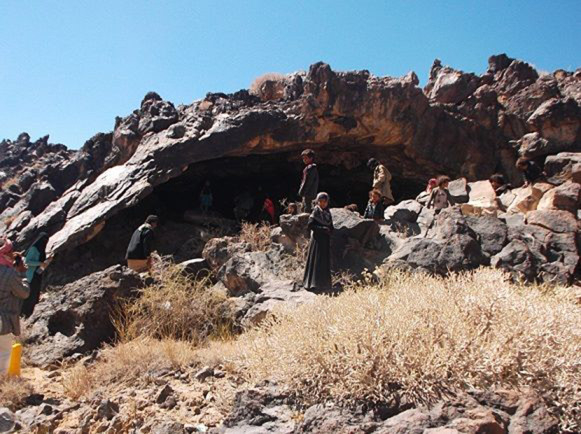
Sana’a: Saleh Ali Al Khoubzi abandoned his small village in Yemen’s Bayda province three weeks ago when fighting flared up between Al Houthis and local tribesmen allied with Al Qaida militants.
He and his big family took refuge in the neighbouring small town of Rada in the same province. “The shelling was too heavy. We decided to flee our homes when 70 mortars landed in my village,” Al Khoubzi told Gulf News from his new accommodation.
The Al Houthi rebels have emerged as a powerful force in the troubled country following their swift and easy capture of the Yemeni capital on September 21. Inspired by their success, the rebels pushed into other provinces in northern Yemen where they easily took control of provinces like Hodeida, Dhamar and Hajja. But when they approached Al Qaida-controlled regions like Bayda, they were met with stiff and bloody resistance.
To defend territories against Al Houthis, local tribes clubbed together with Al Qaida militants. The allegiance could not halt the rebels’ advance.
Al Khoubzi hails from the village of Khoubza that became the battlefield of the deadly clashes between the warring factions before being controlled by the Al Houthis.
Local activists and government officials told Gulf News that the clashes have displaced hundreds of families from areas like Gaifa, Khoubza and Manaseh.
Nasser Al Sane, the director of Rada’s office of ministry of information, said that the humanitarian situation in the war-hit areas is desperate as people have taken refuge in mountains and caves.
“They are in an urgent need of basic requirements like water and shelter. Some displaced people lived with their relatives or friends in the nearby villages, but the unfortunate people had to take shelter with their children in the mountains.”
As the weather is freezing in some areas, the displaced people sent an appeal to the government and NGOs to provide them with shelters.
“People are in need of blankets as the temperature drops to 6C at night,” Abdullah Al Radai, a local activist who deals closely with the displaced people, told Gulf News.
Al Radai said that when battles erupted between Al Houthis and local tribes in early November, he counted 255 families forced to leave their homes. 105 families resided with relatives in Rada and other villages. The remaining families took shelter in caves and mountains.
“I saw 69 women with their children cramming in a cave near Khoubza,” he said. “The children are suffering from severe coughs and in need of blankets and health care. Children have not washed their faces for days.”
At the same time, Al Houthi rebels have fully gained control of the regions in Rada district, driving Al Qaida to the neighbouring rugged and mountainous region of Yakla. A senior government official in the province’s capital, Bayda, told Gulf News that the clashes have ceased when the Al Houthis tightened grip on former strongholds of Al Qaida.
“Khoubza and the areas are under control of Ansar Allah,” the official said on condition of anonymity, using another Arabic name for the rebels.
The rebels also called upon the displaced families to return to their homes. But people, like Al Khoubzi, fear from Al Qaida’s reprisal attacks that claimed dozens of Al Houthis in recent weeks. The militants have said on affiliated Twitter accounts that car bombs and suicide attacks have killed many rebels in Bayda province.
But, for many other families who returned home, living under the rubble of their homes is far better than living in the caves.
On Thursday, Tareq Abu Surima, the director of Rada’s office of ministry of social affairs, told Gulf News that many of the displaced began trickling into Khoubza village after receiving assurance from Al Houthis about security in the area.
Abu Surima said that 70 families in Rada, 257 in Khoubza, 70 in Sailat Al Jarah are pleading for urgent aid like food and clothes.
“We have started distributing emergency relief to the families sent from organisations like Yemen Red Crescent, Unicef, the World Food Programme and Doctors Without Borders.”
At the same time, government media reported last week that the Yemen Red Crescent distributed bags of wheat, food, water filters to 180 displaced families from Bayda who settled down in the neighbouring Dhamar province.















